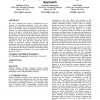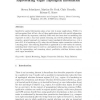379 search results - page 9 / 76 » Order in Space: A General Formalism for Spatial Reasoning |
SEMWEB
2010
Springer
13 years 3 months ago
2010
Springer
Space and time have not received much attention on the Semantic Web so far. While their importance has been recognized recently, existing work reduces them to simple latitude-longi...
GIS
2006
ACM
14 years 9 months ago
2006
ACM
The W3C's Semantic Web Activity is illustrating the use of semantics for information integration, search, and analysis. However, the majority of the work in this community ha...
COSIT
2007
Springer
14 years 2 months ago
2007
Springer
Higher level semantics are considered useful in the geospatial domain, yet there is no general consensus on the form these semantics should take. Indeed, knowledge representation p...
IJAR
2008
13 years 8 months ago
2008
Qualitative spatial information plays a key role in many applications. While it is well-recognized that all but a few of these applications deal with spatial information that is a...
CIKM
2007
Springer
14 years 2 months ago
2007
Springer
Topological information plays a fundamental role in the human perception of spatial configurations and is thereby one of the most prominent geographical features in natural langu...


